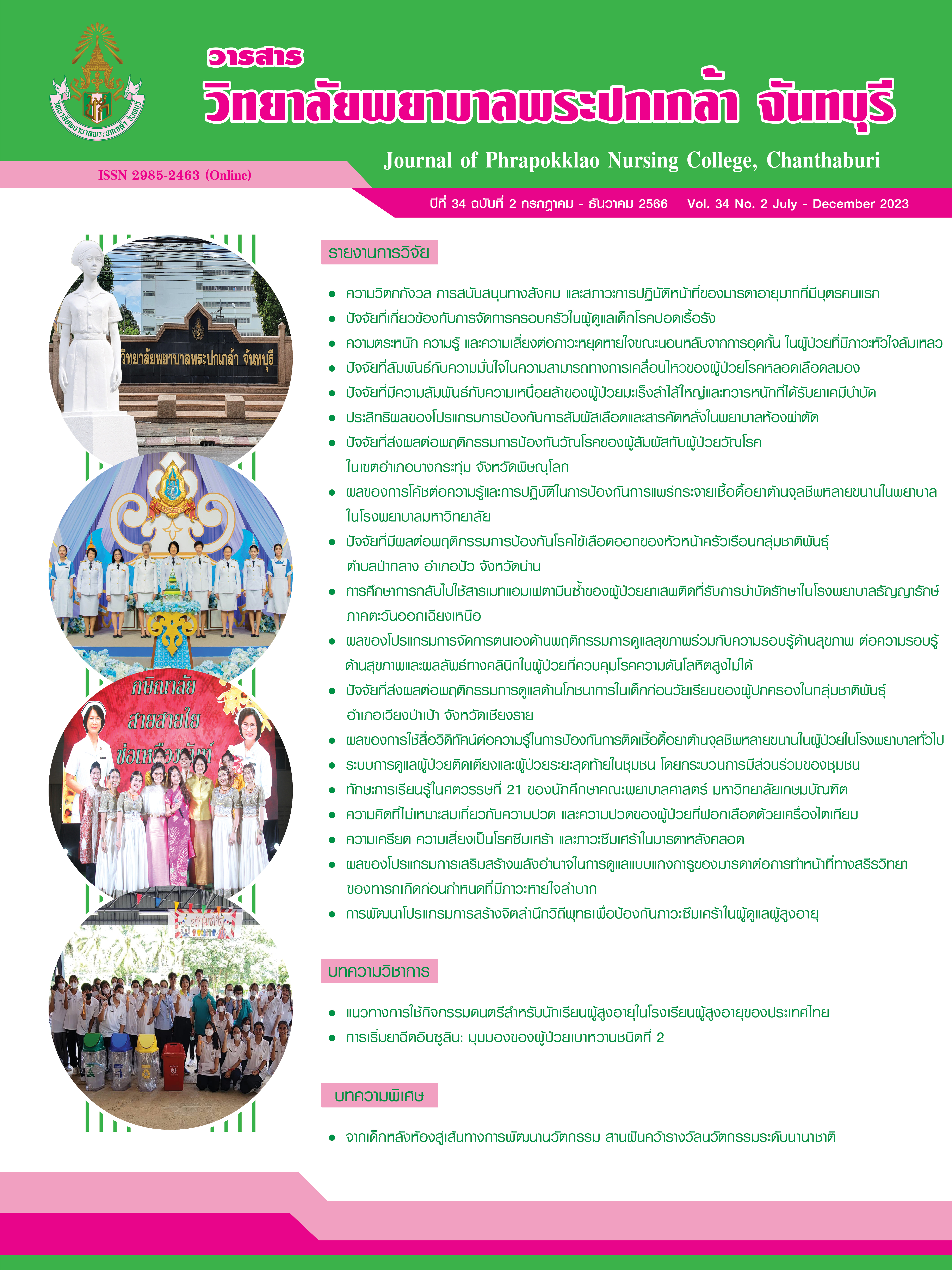Awareness, Knowledge, and Risk for Obstructive Sleep Apnea among Patients with Heart Failure
Keywords:
Obstructive sleep apnea, Heart failure, Awareness, Knowledge, Risk for obstructive sleep apneaAbstract
This descriptive research aimed to study awareness, knowledge, and risk for obstructive sleep apnea among patients with heart failure. The participants consisted of 354 patients with heart failure who received services at a heart clinic, outpatient department of Maharaj Nakorn Chiang Mai Hospital, McCormick Hospital, Chiang Mai Province, and Lamphun Hospital. The research instruments were composed of the demographic data record form, the awareness and knowledge of obstructive sleep apnea questionnaire with a reliability of .96, and the Berlin Questionnaire with a reliability of .89. Data were collected from December 2019 to May 2020. Statistics used for data analysis included frequency, percentage, mean, and standard deviation.
The research results revealed that 78.53% of patients with heart failure were not aware of obstructive sleep apnea. Most patients had no knowledge of obstructive sleep apnea on meaning (77.40%), risk factors (79.94%), signs (79.94%), health impact (79.94%), and treatment (79.94%). In addition, 56.50% of patients with heart failure were at low risk for having obstructive sleep apnea.
This research suggests that health care providers should screen risk for obstructive sleep apnea among patients with heart failure as well as provide knowledge and enhance awareness of obstructive sleep apnea.
References
ประสิทธิ์ มหากิจ. (2560). ผลกระทบทางสังคมจากภาวะหยุดหายใจขณะหลับจากการอุดกั้น. ใน กัลยา ปัญจพรผล, ประพันธ์ กิตติวรวิทย์กุล, นฤชา จิรกาลวสาน, มณฑิดา วีรวิกรม, และวิชญ์ บรรณหิรัญ (บ.ก.), เวชศาสตร์การนอนหลับขั้นพื้นฐานสำหรับแพทย์ พยาบาล นักศึกษา และบุคลากรทางการแพทย์ (น. 83–88). กรุงเทพฯ: บียอนด์ เอ็นเทอร์ไพรซ์.
สมาคมแพทย์โรคหัวใจแห่งประเทศไทยในพระบรมราชูปถัมภ์ ร่วมกับชมรมหัวใจล้มเหลวแห่งประเทศไทย. (2557). แนวทางเวชปฏิบัติเพื่อการวินิจฉัยและการดูแลรักษาผู้ป่วยภาวะหัวใจล้มเหลว พ.ศ. 2557. กรุงเทพฯ: เอ-พลัส พริ้น.
สำนักโรคไม่ติดต่อ กรมควบคุมโรค. (2563). จำนวนอัตราป่วยและตาย ปี 2559–2562. สืบค้นจาก http://www.thaincd.com/index.php
Alshehri, A. M., Alshehri, M. S., Alamri, O. M., Alshehri, F. S., Alshahrani, M., Alflan, M. A., & Alshahrani, M. S. (2020). Knowledge, awareness, and attitudes toward obstructive sleep apnea among the population of the Asir Region of Saudi Arabia in 2019. Cureus, 12(3), e7254. doi:10.7759/cureus.7254
Arous, F., Boivin, J. M., Chaouat, A., Rumeau, C., Jankowski, R., & Nguyen, D. T. (2017). Awareness of obstructive sleep apnea-hypopnea syndrome among the general population of the Lorraine Region of France. European Annals of Otorhinolaryngology, Head and Neck Diseases, 134(5), 303–308. doi:10.1016/j.anorl.2017.02.010
Bloom, B. S. (1971). Taxonomy of educational objectives: The classification of educational goals, handbook 1 cognitive domain. London: Longmans.
Breckler, S. J. (1986). Attitude structure and function. New York: Lawrence Erlbaum Associates.
Brisco, M. A., & Goldberg, L. R. (2010). Sleep apnea in congestive heart failure. Current Heart Failure Reports, 7(4), 175–184. doi:10.1007/s11897-010-0033-5
Cochran, W. G. (1977). Sampling techniques (3rd ed.). New York: John Wiley & Sons.
Good, C. V. (1973). Dictionary of education (3rd ed.). New York: McGraw-Hill.
Hickey, A., O’Hanlon, A., McGee, H., Donnellan, C., Shelley, E., Horgan, F., & O’Neill, D. (2009). Stroke awareness in the general papulation: Knowledge of stroke risk factors and warning signs in older adults. BMC Geriatrics, 9, 1–8. doi:10.1186/1471-2318-9-35
Javaheri, S. (2006). Sleep disorders in systolic heart failure: A prospective study of 100 male patients. The final report. International Journal of Cardiology, 106(1), 21–28. doi:10.1016/j.ijcard.2004.12.068
Kasai, T. (2012). Sleep apnea and heart failure. Journal of Cardiology, 60, 78–85. doi:10.1016/j.jjcc.2012.05.013
Kasai, T., & Bradley, T. D. (2011). Obstructive sleep apnea and heart failure: Pathophysiologic and therapeutic implications. Journal of the American College of Cardiology, 57(2), 119–127. doi:10.1016/j.jacc.2010.08.627
Lee, C. S., & Auld, J. (2015). Heart failure: A primer. Critical Care Nursing Clinics of North America, 27(4), 413–425. doi:10.1016/j.cnc.2015.07.009
National Heart, Lung, and Blood Institute. (2012). What is sleep apnea. Retrieved from https://www.nhlbi.nih.gov/health/health-topics/topics/sleepapnea/
Netzer, N. C., Stoohs, R. A., Netzer, C. M., Clark, K., & Strohl, K. P. (1999). Using the Berlin Questionnaire to identify patients at risk for the sleep apnea syndrome. Annals of Internal Medicine, 131(7), 485–491. doi:10.7326/0003-4819-131-7-199910050-00002
Oldenburg, O., Lamp, B., Faber, L., Teschler, H., Horstkotte, D., & Töpfer, V. (2007). Sleep-disordered breathing in patients with symptomatic heart failure: A contemporary study of prevalence in and characteristics of 700 patients. European Journal of Heart Failure, 9(3), 251–257. doi:10.1016/j.ejheart.2006.08.003
Sia, C. H., Hong, Y., Tan, L. W. L., van Dam, R. M., Lee, C. H., & Tan, A. (2017). Awareness and knowledge of obstructive sleep apnea among the general population. Sleep Medicine, 36, 10–17. doi:10.1016/j.sleep.2017.03.030
Sin, D. D., Fitzgerald, F., Parker, J. D., Newton, G., Floras, J. S., & Bradley, T. D. (1999). Risk factors for central and obstructive sleep apnea in 450 men and women with congestive heart failure. American Journal of Respiratory and Critical Care Medicine, 160(4), 1101–1106. doi:10.1164/ajrccm.160.4.9903020
Sommerfeld, A., Althouse, A. D., Prince, J., Atwood, C. W., Mulukutla, S. R., & Hickey, G. W. (2017). Obstructive sleep apnea is associated with increased readmission in heart failure patients. Clinical Cardiology, 40(10), 873–878. doi:10.1002/clc.22738
Suksakorn, S., Rattanaumpawan, P., Banhiran, W., Cherakul, N., & Chotinaiwattarakul, W. (2014). Reliability and validity of a Thai version of the Berlin Questionnaire in patients with sleep disordered breathing. Journal of the Medical Association of Thailand, 97(Suppl. 3), 46–56. Retrieved from file:///C:/Users/Admin/Downloads/10905930.pdf
Tasali, E., & Ip, M. S. (2008). Obstructive sleep apnea and metabolic syndrome: Alterations in glucose metabolism and inflammation. Proceedings of the American Thoracic Society, 5(2), 207–217. doi:10.1513/pats.200708-139MG
Yumino, D., Wang, H., Floras, J. S., Newton, G. E., Mak, S., Ruttanaumpawan, P., … Bradley, T. D. (2009). Prevalence and physiological predictors of sleep apnea in patients with heart failure and systolic dysfunction. Journal of Cardiac Failure, 15(4), 279–285. doi:10.1016/j.cardfail.2008.11.015
Downloads
Published
How to Cite
Issue
Section
Categories
License
Copyright (c) 2023 Journal of Phrapokklao Nursing College, Chanthaburi

This work is licensed under a Creative Commons Attribution-NonCommercial-NoDerivatives 4.0 International License.
เนื้อความ ข้อมูล และรายการอ้างอิงที่ผู้เขียนใช้ในการเขียนบทความเพื่อลงตีพิมพ์ในวารสารวิทยาลัยพยาบาลพระปกเกล้า จันทบุรี ถือเป็นความคิดเห็นและความรับผิดชอบของผู้เขียน คณะผู้จัดทำวารสารไม่จำเป็นต้องเห็นพ้องด้วยหรือร่วมรับผิดชอบ
บทความที่ได้รับการลงตีพิมพ์ในวารสารวิทยาลัยพยาบาลพระปกเกล้า จันทบุรี ถือเป็นลิขสิทธิ์ของวารสารวิทยาลัยพยาบาลพระปกเกล้า จันทบุรี หากหน่วยงานหรือบุคคลใดต้องการนำส่วนหนึ่งหรือทั้งหมดของบทความไปเผยแพร่ต่อเพื่อวัตถุประสงค์ใด ๆ จะต้องได้รับอนุญาตจากบรรณาธิการวารสารก่อน



